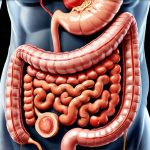Bloating is an incredibly common experience, something many people live with as a regular part of life. It’s rarely discussed openly, often dismissed as just “part of getting older” or attributed to simply having eaten too much. However, for a growing number of individuals, bloating isn’t merely occasional discomfort; it becomes persistent and significantly impacts quality of life. While it can occur at any age, many people find that bloating tends to increase with age, becoming more frequent, severe, and harder to manage. Understanding why this happens requires looking beyond simple dietary indiscretions and delving into the complex interplay of physiological changes that naturally occur as we get older.
This isn’t about accepting bloating as inevitable. It’s about understanding the root causes so you can proactively address it through lifestyle adjustments and informed conversations with healthcare professionals. Often, what seems like a simple case of “feeling full” is actually indicative of deeper shifts happening within our digestive system, hormonal balance, and even muscle function. The good news is that recognizing these changes empowers us to take control and mitigate the discomfort associated with bloating, improving overall well-being as we age.
Physiological Changes & Digestive Slowdown
As we age, numerous physiological processes begin to change, impacting digestion in particular. One of the most significant alterations is a natural slowing down of peristalsis – the wave-like muscle contractions that move food through our digestive tract. This slowdown allows more time for fermentation to occur in the gut, leading to increased gas production and, consequently, bloating. The muscles of the intestinal wall may also lose some tone, further contributing to this slower transit time.
Reduced stomach acid production is another common age-related change. Stomach acid isn’t just about breaking down food; it plays a critical role in sterilizing what we ingest, preventing bacterial overgrowth. Lower acidity can lead to an imbalance in gut bacteria (dysbiosis), which can contribute significantly to bloating and discomfort. This altered microbiome produces more gas as a byproduct of its activity. It’s important to note that some medications commonly used by older adults, like proton pump inhibitors for heartburn, can further reduce stomach acid production, exacerbating the problem. If you are experiencing persistent issues, it may be helpful to explore safe way chocolate consumption alongside other dietary adjustments.
Finally, changes in the composition of our gut microbiota become increasingly pronounced with age. A diverse and balanced microbiome is essential for optimal digestion, nutrient absorption, and immune function. As we get older, this diversity often decreases due to factors like dietary shifts, medication use (especially antibiotics), and decreased physical activity. This loss of microbial diversity can lead to an overgrowth of gas-producing bacteria, resulting in more frequent and noticeable bloating. Understanding drinks to avoid can also help manage your microbiome.
Hormonal Shifts & Their Impact
Hormonal fluctuations play a substantial role in bloating, particularly for women as they approach menopause. Estrogen levels naturally decline during perimenopause and menopause, leading to changes in fluid retention and digestive function. These hormonal shifts can significantly impact the gut microbiome, contributing to dysbiosis and increased gas production. The fluctuating estrogen levels also affect the intestines’ motility, potentially exacerbating the slowing of peristalsis discussed earlier.
Beyond estrogen, other hormonal changes associated with aging can contribute to bloating. Cortisol, often referred to as the “stress hormone,” tends to increase with age in response to chronic stressors. Elevated cortisol levels can disrupt digestive function and exacerbate gut inflammation, leading to increased bloating. Similarly, declining testosterone levels in men can affect muscle mass, including the abdominal muscles that support digestion and intestinal motility.
It’s important to understand that hormonal changes aren’t just a female concern. While the experience may differ, men also undergo significant hormonal shifts with age that impact digestive health and contribute to bloating. Recognizing these interconnected relationships between hormones, gut health, and aging is crucial for developing effective strategies to manage bloating. Sometimes, upright isn’t enough to alleviate symptoms.
Dietary & Lifestyle Factors Amplified by Age
Dietary habits often evolve as we age, sometimes leading to increased intake of foods known to promote bloating. A decrease in fiber consumption is common, yet fiber is essential for maintaining healthy bowel regularity and preventing constipation – a major contributor to bloating. Similarly, an increase in processed foods, which are often high in sodium and low in nutrients, can lead to water retention and digestive discomfort. Hydration also tends to decline with age, further exacerbating constipation and bloating. Bloating from nowhere is often linked to these habits.
Physical activity levels frequently decrease as we get older, leading to reduced muscle mass and slower metabolic rates. This impacts digestion by slowing down peristalsis and reducing the efficiency of waste elimination. Lack of regular exercise can also contribute to stress and hormonal imbalances, indirectly influencing bloating. Maintaining an active lifestyle, even with moderate exercises like walking or yoga, is essential for supporting digestive health. You might find best time walk beneficial as well!
Finally, chronic stress, which tends to accumulate over a lifetime, can significantly impact gut function and exacerbate bloating. Stress triggers the release of cortisol, as mentioned previously, disrupting digestion and promoting inflammation. Incorporating stress-management techniques such as mindfulness, meditation, or deep breathing exercises can help mitigate these effects and improve overall digestive well-being. If you are experiencing reflux issues alongside bloating it’s important to understand reflux from water. A holistic approach—combining dietary adjustments, regular exercise, and effective stress management—is often most successful in addressing age-related bloating. Evening tea reflux can also be a factor to consider when creating your plan.


















